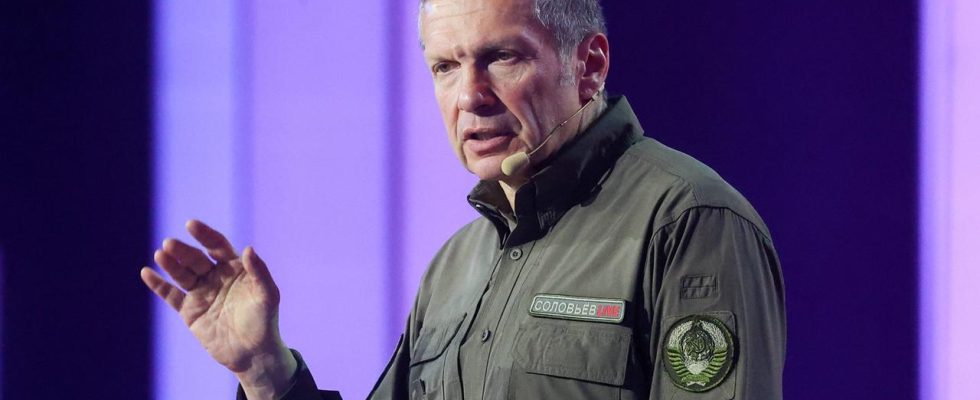Political talk shows are an important part of spreading propaganda in Russia – sometimes with drastic content. Above all, a nuclear escalation is often conjured up.
These are all statements that have been made on political talk shows on Russian television over the past few days: “Ukraine should be liquidated as a nation.” “Either we win or nobody in the world can stay alive” or Volodymyr Zelenskyy should be beheaded and everyone in Russia who stands for Ukraine killed.
The television discussions are conducted with aggressive vocabulary. At the end of April, for example, a talk show did not discuss the probability of a nuclear war, but hypotheses were already being put forward as to how Russia could shape world domination after a nuclear war has been won.
Talk formats central part of Russian propaganda
Political talk shows, together with the news, dominate the programming of Russian television. “The talk shows are very important for Russian propaganda and play a central role on state television,” says Magdalena Kaltseis, assistant professor of Russian linguistics and Russian didactics at the University of Innsbruck. They could also reach people who are less politically interested, since they offer a certain entertainment value. In addition, they are easy and inexpensive to produce.
For example, political talks and news on the Perwy Kanal in February 2022 will have around eleven hours of broadcasting time per day. The talk shows in Russia reach an audience share of up to 25 percent, sometimes even more. Especially shortly after the start of the Russian war of aggression, the ratings skyrocketed, but they are now declining somewhat. For comparison: In Germany, the talk show share is in the ARD and the ZDF according to the ARD-press office at about two to three percent of a broadcast day, the highest average ratings in the current year has Markus Lanz (14.2 percent).
“No other program anymore”
Talk shows have been elementary since Vladimir Putin began his third term as president in 2012 – but according to Kaltseis, there was a rapid increase with the beginning of the war in eastern Ukraine in 2014. “From February 2022, there were only news and talk shows on Russian television,” says Kaltseis. “There were no other programs.” The advantage of talk shows is that anything can be said there. “It heats up the atmosphere incredibly.”
Thus, the host of the program Vremja pokashet (Eng. Time will tell) called one of the “pro-Ukrainian” guests a “fascist louse” and had him thrown out of the studio after he said that the Red Army was from Ukraine in 1941 ” shamefully cut off”.
In the study “Broadcasting Agitainment” by Vera Tolza and Yuri Teper, University of Manchester, since 2012 Russia’s new media strategy has been referred to as “agitainment”. “Ideologically informed political reporting, packaged by adapting specific global media formats to local needs, to appeal to less engaged and even skeptical viewers.” Political talk shows would deliberately over-personalize complex issues, using gross, out-of-context generalizations and blunt exaggerations.
Russian media: close to the state and loyal to the Kremlin
Television is still the most important medium in Russia. According to opinion polls, more than 60 percent of the Russian population rely on television as a source of political information. Unlike in Germany, most Russian television channels are wholly or partly financed by the government – including the three channels with the widest reach, Rossija 1, the Perwy Kanal and NTW.
“How close to the state and loyal to the regime the talk shows are is also made clear by the fact that some members of the Duma were also the moderators of some programs at the same time, such as Pyotr Tolstoy and Vyacheslav Nikonov,” says Kaltseis. Unsurprisingly, it is mainly the Russian narratives on the war in Ukraine that are being disseminated – it was only in January that Nikonov referred to the USA and NATO as the founders of the “Fourth Reich”, alluding to the German Nazi regime.
Hardly any differing views
However, a real political discussion does not take place and is not the goal either: “People whose opinion does not agree with the official position are ridiculed, shouted at and sometimes physically attacked.” Opposition voices have now become very rare, while politicians from the ruling party, United Russia, are among the permanent staff, says Kaltseis.
Julia Smirnova, senior researcher at the Institute for Strategic Dialogue Germany (ISD), agrees. “With the passage of the law against so-called fake news or discrediting of the Russian army, any opinion or representation of the war that deviates from the official line was made a criminal offense.”
Shortly after the start of the war of aggression, the Duma passed a law according to which the dissemination of “fake news” about the Russian army can be punished with up to 15 years in prison. Until February 2022 there were still a few non-state television stations in Russia – including the station Doschd, which, however, could only be received via the Internet and was declared a “foreign agent” by the Russian government in 2021. As a result of the war and increasing pressure and threats against non-state media, Dozhd was forced to cease broadcasting in March 2022.
discrediting Of the West
The fact that Ukraine and the West in general are discredited on Russian state television is an important part of domestic propaganda, says Smirnova. “But it’s also about distracting from the fact, for example, that the war isn’t going exactly according to plan for the Kremlin, that the Russian army isn’t as strong as expected.”
The Russian regime is concerned with strengthening the myth of Russia as a superpower. According to the British study, talk shows made particularly frequent use of conspiracy stories. For example, during coverage of the annexation of Crimea events in Ukraine were systematically portrayed as an essentially US or Western conspiracy.
According to Smirnova, the situation in the West is also being portrayed much more dramatically on Russian television due to the sanctions against Russia. “One talk show claimed that the UK would eat squirrels because of the food shortage and still continue to supply arms to Ukraine. Really very absurd stories that should stick in the minds of the audience.”
Increase foreign guests credibility
The Center for Information Resilience (CIR) report “Ukraine Fatigue” shows how Russia is deliberately spreading disinformation narratives in order to reduce support for Ukraine in Western countries and increase possible Ukraine fatigue. For example, Russia is spreading the word that Ukrainian refugees are Nazis or are not satisfied with what they are getting from the receiving countries. Russia also repeatedly emphasizes that Ukraine provoked the war and left Russia no other choice. Nina Jankowicz, author of the study and Vice-President of the CIR, says: “Russia is trying to use these narratives to cast doubt on its guilt for the war, because then it can break Western solidarity with regard to the sanctions.”
The Russian propaganda is very precisely tailored to its respective audience, says co-author Sophia Freuden. The Kremlin knows what and in what form it is addressing the Russian public and what to other countries, so that it can intervene in opinion-forming. Foreign actors are regularly invited as guests. For example, the American Tucker Carlson and Germans like Alina Lipp or the AfD member of the Bundestag Steffen Kotré have already appeared on Russian talk shows. They are used reciprocally in Russian propaganda.
For one thing, they are supposed to lend credibility to the narratives. “In most cases, their views are very close to Russian propaganda. Nevertheless, they are portrayed as credible witnesses on Russian TV,” says Smirnova from the ITS. On the other hand, guests like Lipp or Kotré would spread the arguments they heard on talk shows or read in Russian propaganda magazines to a Western audience, adds Jankowicz.
“Everything that harms the enemy benefits us”
Smirnova sees the sometimes martial rhetoric, especially of the talk shows with open threats of nuclear war, as “very dangerous”. “The constant repetition normalizes the scenario that Russia could actually use nuclear weapons. This threatening rhetoric fuels hatred against Ukraine and the West and dehumanizes the population of the countries against which nuclear weapons are to be used. This lowers the inhibition threshold for violence and destruction even more continues and can have serious long-term consequences for society.”
Anton Himmelspach, political editor of decoder.org, sees the nuclear threat as part of Russia’s domestic propaganda strategy. “The motto is: Everything that harms the enemy is of use to us. In the event of a nuclear war, it would be over for everyone, not just for the West. Of course, the propaganda doesn’t reflect that.” The image of the West as an enemy is central, it is created in order to stabilize the regime at home. This is typical of autocratic systems.
Himmelspach sees the actual contradiction in the narrative, on the one hand presenting oneself as an attacked party and on the other hand openly threatening an escalation, as typical of Putin’s system. “Russian propaganda often pursues a perpetrator-victim reversal and contains contradicting narratives,” he says. This is also related to the opportunism of wanting to unite Russian society with the various narratives behind Putin – through common enemy images or the belief in one’s own strength.
“Propaganda creates high approval ratings”
How successful the talk shows are in terms of Russian propaganda is difficult to assess, says Smirnova. “It is not easy to measure the effectiveness of individual propaganda measures. Political talk shows are not among the most popular programs on Russian television at the moment. But overall, the repressive system, together with the propaganda, ensures that Putin has high approval ratings and a reluctance to protest against the war .”
Abroad, on the other hand, Russia’s information war has only had limited success, says Janowicz. One can see that Russian narratives are getting caught in the Global South, but in Europe and the US there is still a stable Western coalition behind Ukraine. “I would say the communication strategy was not as successful as Russia had hoped.”


